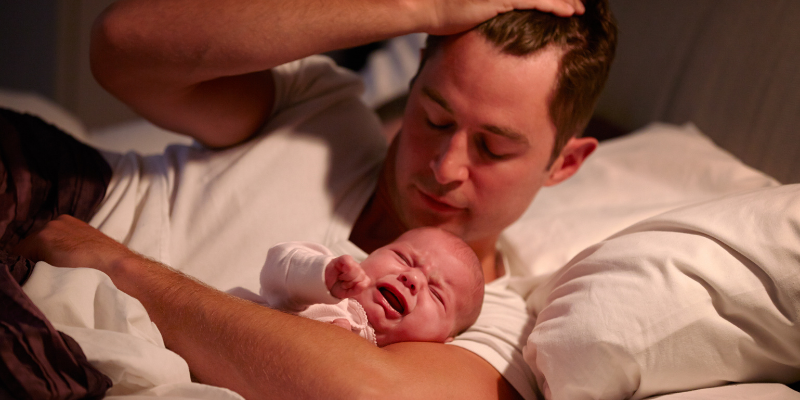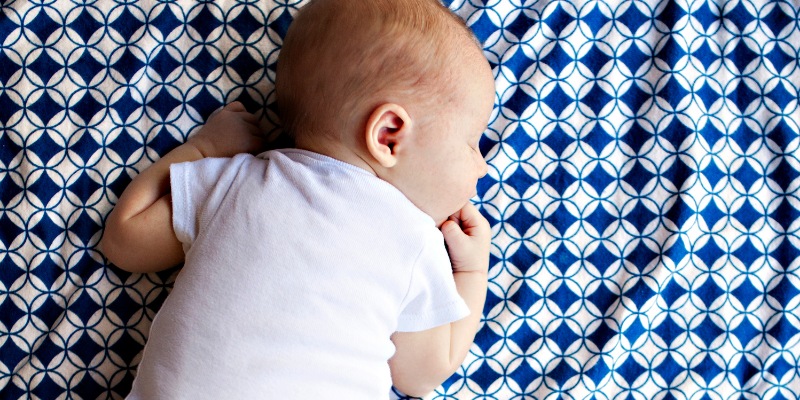
If you’re on the fence about teaching your baby how to sleep, you’re in the same boat as most parents who are considering sleep training. As a Fort Collins Sleep Coach, I see this all the time.
On the one hand, you know that your family must sleep, sleep is a basic need. You have scoured Google for blogs, a Fort Collins Sleep Coach, and read everything you can find on getting your baby sleep. Most likely your research has confirmed that your baby needs a lot of quality sleep, as it’s vital to their development and growth. You’re also 100% sure that you and your baby are going to need some help to get this great sleep you know is so vital.
On the other hand, reality is that you are nervous as hell about it.
Almost every parent that comes to me for sleep training is riddled with anxiety and questions about what is entailed. They accept and acknowledge that there is a problem that needs correcting yet they feel like they are on pins and needles as they learn the steps of how they can teach their baby or toddler to sleep better.
Your brain without sleep
You and your partner are probably running on empty at this point when it comes to your own sleep. If your baby’s not sleeping, it’s almost a guarantee that you’re not sleeping either and that can wreak havoc on your emotional well-being.
Sleep deprivation stimulates activity in the amygdala, which is a part of the brain that controls several of your immediate emotional reactions.
According to a 2007 joint study between Harvard Medical School and U of C Berkeley, “…a lack of sleep inappropriately modulates the human emotional brain response to negative aversive stimuli.”
Or, in layman’s terms, you’re likely to overreact when something goes wrong. So when, say, your baby starts to cry, you’re less inclined to calmly think, “I wonder what he needs,” and much more likely to think things like, “I’m a complete failure as a mother. What am I doing wrong?”
This is what happens after one night of poor sleep and the sleep deprivation that follows. Now imagine what chronic lack of sleep over the course of weeks, months, or years, can lead to. You may even be experiencing it right now. It leaves you feeling helpless, inadequate, and riddled with anxiety.
Why is crying so triggering?
Crying is likely the number one reason parents put off any sort of sleep training, whether formal or DIY. Many parents have an extreme fear of their baby crying and what this means for their child’s wellbeing. They spend so much time trying to manage their baby’s cries, that they are being held hostage by exhausting routines and strategies to get their baby to sleep.
As a baby sleep consultant, I am quick to address the crying question with my clients and help them understand the “why” behind their baby’s cries. Is your baby going to cry during sleep training? The answer is very likely yes. It is extremely likely that your baby’s going to cry when you implement new routines and introduce change surrounding bedtime and their nighttime sleep.
Is your child also going to cry when they get dropped off on their first day of school? Again, it’s very likely this new and big endeavor will bring on some tears.
Will you child throw a fit when you turn off their favorite cartoons, or when you tell them no to candy before bed?
I almost guarantee it. And even though you know they’re not in any danger or genuine distress in those situations, and you may even feel embarrassed or upset about their behavior, you’re still going to feel your heart explode when you hear your baby crying.
If we look at this objectively, we can see that there’s an actual reason why the sound of a crying baby causes us such distress, and it’s not because of the actual level of urgency. Dr. David Poeppel, Professor Of Psychology & Neural Science at NYU, found that a crying baby differs from other environmental noises in something called the “amplitude modulation rate,” meaning how often the loudness of a sound changes.
Crying babies, along with car alarms and police sirens, have a modulation rate of about 100 times per second, compared to a regular speaking voice, which hovers somewhere between 4 or 5.
Experiments with an MRI to monitor the brains of people while listening to a variety of sounds, Poeppel found that baby screams have a unique ability to trigger activity in… you guessed it, our old friend, the amygdala.
Your brain may be playing tricks on you
Now, I could walk you through some deep breathing exercises to help calm your anxiety before we start teaching your baby new sleep skills but I’m guessing you already know what works for you. Where I think I can be of the biggest value to parents is by shining a light on what is happening behind the scenes in the brain and how sleep deprivation is rendering parents emotionally helpless. Your brain, despite having some really great intentions, is playing tricks on you. Likely if your brain was able to identify in the moment that these cries were working towards a bigger goal, than it wouldn’t have you feeling guilt and anxiety in the first place.
It’s harder when it’s YOUR baby
When talking about sleep and parenting in general, there is all the babies, and then there is your baby. When it comes to your baby, the research and evidence doesn’t override your concern that you might be doing something wrong. This is especially true if your baby or toddler doesn’t fit into the “flexible with change” category. Maybe you’ve tried sleep training before when they were younger, with no success and lots of crying.
I want to explore what is happening here. Is this your maternal instinct kicking in? Are you subconsciously aware of an underlying threat to your baby? Is mother nature trying to tell you not to teach your baby to sleep?
Have you ever given out parenting advice to a friend or family member but then been guilty of falling into the same rut as they did, and unable to follow the advice you gave them? It’s harder when it’s your baby, that’s a fact. Even as a Fort Collins sleep coach, I find that with my own threenager, I have a much harder time taking my own advice and live in denial a few extra days than necessary.
Managing anxiety
As a sleep deprived parents, running on coffee and very little sleep, it’s likely you are suffering from an array of emotions on a daily basis. I regularly ask my clients to provide surveys and feedback about how they felt prior to sleep training, compared to after. Would you be surprised if I told you that 100% of parents felt anxious on a regular basis? What about the fact that parents reported getting on average of 4-5 hours of sleep a night or that on average, most parents had not slept in their own bed all night in 7 months (26 months was the highest!!). A large percentage of parents also admitted to feeling guilt, hopelessness, depressed, unproductive at work, impatient, angry, reactive, and helpless. One mom went so far as to say sleep training saved her life, after contemplating suicide during a painful battle with postpartum depression, intensified by extreme sleep loss.
When surveyed two weeks after starting the sleep training process, 100% of my clients reported fewer symptoms of emotional distress and described feelings of hope, patience, optimism, and happiness. On average, parents were enjoying 8-10 hours of sleep a night, often sleeping through the night as well as their child. They genuinely enjoy the time they spend with their child and left their resentments behind.
If you’re a tired parent on the fence about sleep training, I encourage you to reach out and end your sleep deprivation. From one mama to another, you do not have to just survive anymore. As a baby sleep consultant, I find it essential that parents find a path to restful sleep for them and their child. Reach out today and find out what sleep training means for your family.
As you search for a Fort Collins sleep coach, please reach out. I’m here to help you sleep better and take care of your mental health. Contact me for more information.

